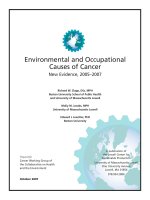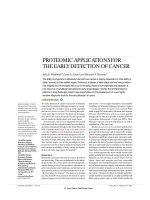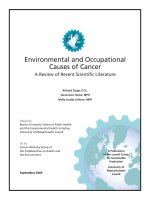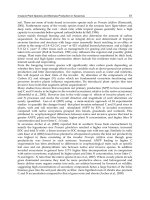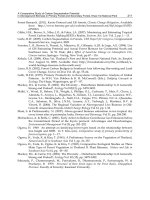Chapter 078. Prevention and Early Detection of Cancer (Part 4) pdf
Bạn đang xem bản rút gọn của tài liệu. Xem và tải ngay bản đầy đủ của tài liệu tại đây (55.14 KB, 5 trang )
Chapter 078. Prevention and Early
Detection of Cancer
(Part 4)
Chemoprevention of Cancers of the Upper Aerodigestive Tract
Smoking causes diffuse epithelial injury in the head, neck, esophagus, and
lung. Patients cured of squamous cell cancers of the lung, esophagus, head, and
neck are at risk (as high as 5% per year) of developing second cancers of the upper
aerodigestive tract. Cessation of cigarette smoking does not markedly decrease the
cured cancer patient's risk of second malignancy, even though it does lower the
cancer risk in those who have never developed a malignancy. Smoking cessation
may halt the early stages of the carcinogenic process (such as metaplasia), but it
may have no effect on late stages of carcinogenesis. This "field carcinogenesis"
hypothesis for upper aerodigestive tract cancer has made "cured" patients an
important population for chemoprevention of second malignancies.
Oral leukoplakia, a premalignant lesion commonly found in smokers, has
been used as an intermediate marker allowing demonstration of chemopreventive
activity in smaller shorter duration, randomized, placebo-controlled trials.
Response was associated with upregulation of retinoic acid receptor-β (RAR-β).
Therapy with high, relatively toxic doses of isoretinoin (13-cis-retinoic acid)
causes regression of oral leukoplakia. However, the lesions recur when the therapy
is withdrawn, suggesting the need for chronic administration. More tolerable doses
of isoretinoin have not proven beneficial in the prevention of head and neck
cancer. Isoretinoin also failed to prevent second malignancies in patients cured of
early-stage non-small cell lung cancer; mortality rates were actually increased in
current smokers.
Premalignant lesions in the oropharyngeal area have also responded to
retinol, α-tocopherol (vitamin E), and selenium. Further study to define the
activity of these drugs is ongoing.
Several large-scale trials have assessed agents in the chemoprevention of
lung cancer in patients at high risk. In the α-tocopherol/β-carotene (ATBC) Lung
Cancer Prevention Trial participants were male smokers, age 50–69 at entry.
Participants had smoked an average of one pack of cigarettes per day for 35.9
years. Participants received α-tocopherol, β-carotene, and/or placebo in a
randomized, 2 x 2 factorial design. After median follow-up of 6.1 years, lung
cancer incidence and mortality were statistically significantly increased in those
receiving β-carotene. α-Tocopherol had no effect on lung cancer mortality, and no
evidence suggested interaction between the two drugs. Patients receiving α-
tocopherol had a higher incidence of hemorrhagic stroke.
The β-Carotene and Retinol Efficacy Trial (CARET) involved 17,000
American smokers and workers with asbestos exposure. Entrants were randomly
assigned to one of four arms and received β-carotene, retinol, and/or placebo in a 2
x 2 factorial design. This trial also demonstrated harm from β-carotene: a lung
cancer rate of 5 per 1000 subjects per year for those taking placebo and of 6 per
1000 subjects per year for those taking β-carotene.
The ATBC and CARET results demonstrate the importance of testing
chemoprevention hypotheses thoroughly before their widespread implementation
as the results contradict a number of observational studies. In the ATBC trial,
those taking α-tocopherol had a one-third reduction in the incidence of prostate
cancer, compared to those not taking α-tocopherol. The Physicians' Health Trial
showed no change in the risk of lung cancer for those taking β-carotene; fewer of
its participants were smokers than those in the ATBC and CARET studies.
Chemoprevention of Colon Cancer
Many of the current colon cancer prevention trials are based on the premise
that most colorectal cancers develop from adenomatous polyps. These trials use
adenoma recurrence or disappearance as a surrogate endpoint for colon cancer
prevention. Early clinical trial results suggest that nonsteroidal anti-inflammatory
drugs (NSAIDs), such as piroxicam, sulindac, and aspirin, may prevent adenoma
formation or cause regression of adenomatous polyps. The mechanism of action of
NSAIDs is unknown, but they are presumed to work through the cyclooxygenase
pathway. In the Physicians' Health Trial, aspirin had no effect on colon cancer
incidence, although the 6-year assessment period may not have been long enough
to evaluate this endpoint definitively. A number of studies suggest that NSAID use
is associated with a lower risk of adenomatous polyps and invasive cancer.
However, prospective trials have not shown that NSAIDs prevent colon cancer.
Cyclooxygenase-2 (COX-2) inhibitors may be even more effective. In a
placebo-controlled trial, high-dose celecoxib reduced the recurrence of colorectal
polyps in patients with familial adenomatous polyposis. The effect on colon cancer
occurrence is unknown. Trials for prevention of sporadic colorectal cancers with
COX-2 inhibitors were initiated but have been complicated by the association of
these drugs with cardiovascular disease.
Epidemiologic studies suggest that diets high in calcium lower colon cancer
risk. Calcium binds bile and fatty acids, which cause proliferation of colonic
epithelium. It is hypothesized that calcium reduces intraluminal exposure to these
compounds. Calcium supplementation decreases the risk of adenomatous polyp
recurrence by ~20%. Trials of calcium with cancer-incidence endpoints are
underway.
The Women's Health Initiative demonstrated that postmenopausal women
taking premarin plus progestin have a 44% lower risk of colorectal cancer
compared to women taking placebo. Of >16,600 women randomized and followed
for a median of 5.6 years, 43 invasive colorectal cancers occurred in the hormone
group and 72 in the placebo group. The positive effect on colon cancer is
mitigated by the modest increase in cardiovascular and breast cancer risks
associated with combined estrogen plus progestin therapy. Colorectal cancers
diagnosed in women taking estrogen and progestin were in more advanced stage
than those in women taking placebo.
A case-control study suggested that statins decrease the incidence of
colorectal cancer. However, a meta-analysis of statin use showed no protective
effect of statins on overall cancer incidence or death.


